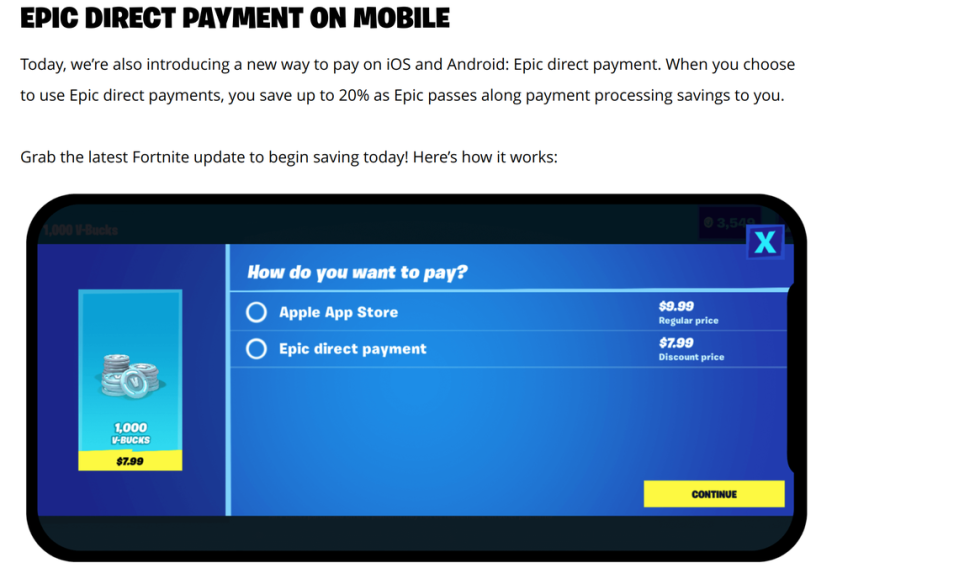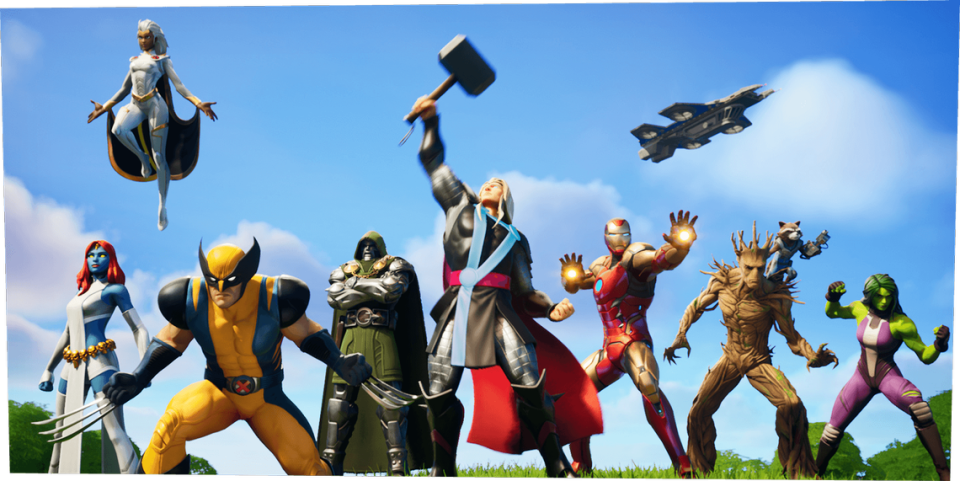Epic Games v. Google is underway. What to know about the Cary company’s Fortnite trial.
Epic Games is battling one of the world’s richest companies in a high-profile antitrust case that could shape the price of mobile phone applications.
Sound familiar?
In August 2020, Cary-based Epic Games sued Apple and Google, alleging both maintain unlawful monopolies through their respective app stores and payment systems.
Epic is the creator of Fortnite, a wildly popular free game that generates revenue when players buy in-game accessories. Apple and Google respectively charge 15% to 30% fees on such transactions — which critics have called the “Apple tax” and “Google tax.”
Led by billionaire CEO Tim Sweeney, Epic contends it and other app developers would offer lower prices if they had their own payment platforms. Apple and Google counter that allowing more alternative options would jeopardize security.
Epic v. Apple has already made its way through district and appellate courts. The U.S. Supreme Court could be next.
It’s now time for Epic v. Google. Last week, both sides made their opening arguments in a Northern California district court. What has the trial already revealed? Why should customers care? And how does this differ from the case Epic waged against Apple?
Let’s dive in.
Why should I care about this case?
“People ought to care if it means that users, the players of (mobile) games, are going to get a lower price,” said Eleanor Fox, an antitrust professor at New York University.
OK then. How did it begin?
On Aug. 13, 2020, Epic introduced an alternative way for Apple iOS and Google Android users to purchase “v-bucks,” the in-game currency of Fortnite.
Mobile players on these operating systems previously had to buy v-bucks through Apple and Google payment systems, both of which took 30% of the revenue major app developers generate. Epic said sidestepping these fees allowed it to offer customers v-bucks at lower prices.
It was later disclosed that Epic’s decision to directly offer v-bucks was part of an intentional plan, dubbed Project Liberty, to lure Apple and Google into antitrust litigation.

Sure enough, the tech titans booted Fortnite from the App Store and Google Play Store the same day, stating Epic violated their developer agreement policies.
Epic promptly sued Apple and Google (which then sued Epic back.)
What was the outcome of the Apple trial?
After a three-week trial in May 2021, a U.S. district court judge issued a split decision favoring the iPhone maker, which won nine of the case’s 10 claims.
The judge determined Apple does not operate an unlawful monopoly through its App Store and payment system. However, she did find Apple was violating California’s Unfair Competition Law by banning app developers from steering to alternative payment options outside the App Store.
This spring, the Ninth Circuit Court of Appeals upheld the decision. In September, Epic Games petitioned the U.S. Supreme Court to hear the case.
Google noted Epic’s shortcomings against Apple in a Nov. 2 blog post ahead of the current trial.
“They have already sued Apple and lost twice,” wrote Google Vice President of Government Affairs Wilson White. “Next week they are trying their luck with Android by bringing a case that has even less merit given the flexibility and choices Android offers.”
Wait, so Google gives app developers more choices than Apple?
Unlike Apple on its iOS operating system, Google allows developers to download their own apps on Androids through a process known as sideloading. Google points to this process as further evidence it doesn’t have an unlawful monopoly.
But Epic argues Google has made sideloading unnecessarily cumbersome and scary. To get Fortnite on an Android, for example, users have had to navigate through 16 steps and ignore multiple security warnings.
Google emphasizes many Android phones come preinstalled with alternatives to the Google Play Store. For example, every Samsung phone comes with Samsung’s Galaxy Store.
Epic highlights that the Galaxy Store is not substantial competition, as the vast majority of Android app downloads come from the Google Play Store.
This will be a jury trial. Does that matter?
The Apple case was settled by a judge. The Google case will be decided by a jury. This presents unique circumstances, says Pressly Millen, an antitrust trial lawyer in Raleigh with the firm Womble Bond Dickinson.
“The sum total of knowledge of all of the jurors is going to be very low at the start,” he said. “So, it’s really incumbent on both sides to educate the jury on issues and concepts that are likely to be very abstruse and potentially confusing.”
In his experience, Millen said juries tend to overcome initial knowledge gaps over the course of their trials. He recalled a particular six-week hearing where “jurors understood (the topic) probably about as well as a lot of the people that worked in the industry.”
But on balance, he acknowledged a jury trial “is slightly less predictable.”

The judge in the Epic v. Google case declared neither side can make the jury aware of the Epic v. Apple outcome.
Fox, who has previously done consulting work for Epic, said a judge “is likely to be more a stickler for the law and the jury is more likely to be looking at it from what’s equitable.”
Given the conservative nature of proving antitrust violations, she believes a jury verdict is more likely to favor Epic.
How do you determine if a monopoly is illegal?
Does Google have a monopoly, and if so, does it exercise this control to harm consumers? The answer comes down to determining something called market definition. Does Google operate a monopoly? Well, a monopoly over what?
“Market definition is going to be critical,” Millen said.
Epic argues the market is Android application platforms and payment systems, which Google dominates. But Google counters that the market should be defined more broadly to include app stores and phones. The existence of Apple, Google contends, clearly shows it doesn’t have a monopoly in this market.
What is Project Hug?
In his opening statement, Epic Games attorney Gary Bornstein accused Google of paying app developers to not create their own platforms for Androids. The program was titled “Project Hug,” and Epic categories its payments as bribes.
For example, Epic has argued Google paid the game developer Activision Blizzard around $360 million to launch on the Google Play Store.
“Google pays potential and actual competitors not to compete, literally gives them money and other things of value,” Bornstein said.
Google rejects the categorization of these Project Hug payments as a bribe. “This program did not require exclusivity on Play or prevent developers from opening their own app stores,” White wrote.
Are the CEOs of the two companies going to testify?
Yes. Google CEO Sundar Pichai is scheduled to testify on Tuesday, Nov. 14. Epic Games CEO Tim Sweeney is expected to take the stand later on. Sweeney and Apple CEO Tim Cook each testified in 2021 during the Epic v. Apple case.

Who else has sued Google for antitrust violations?
In July 2021, a coalition of state attorneys general (including North Carolina’s Josh Stein) sued Google, alleging the company used its monopoly in Android app to elevate prices. The sides settled in September ahead of a trial.
State attorneys general have two ongoing antitrust cases against Google: one over online search and another over digital advertising. North Carolina is a plaintiff in the advertising suit.
Match Group, which owns dating apps like Hinge and Tinder, dropped out of the Epic Games antitrust lawsuit last month after settling with Google.
Is Epic Games likely to settle?
The past would indicate it’s not likely. Despite years of costly litigation, Epic has not settled with Apple over its app store dispute. And in the Google fight, both sides have had plenty of time to come to the table.
Before the lawsuit, Google offered Epic $147 million to launch Fortnite on the Google Play Store. Epic declined.
Epic does stand to financially benefit from offering Fortnite to mobile players directly, but Sweeney has framed his fights with Apple and Google as matters of principle.
“It’s not just Epic being exploited by Apple, but it’s every developer who goes along with that scheme colluding with Apple and Google to further their monopoly,” he told NPR in 2020.
After the attorneys general settled their antitrust lawsuit over Google’s app store, Sweeney posted on X, “We’re fighting for consumer and developer freedom to do business directly, free of monopoly stores, monopoly payment processors, and monopoly taxes.”
Just how popular is Fortnite?
Epic has many games — including well-known titles like Infinity Blade and Gears of War — but nothing compares to the global sensation that was (and remains) Fortnite. Launched in 2017, the battle royale series is set in a candy-colored world with bright avatars who fight, interact, and sometimes dance.
In March, Sweeney shared that Fortnite still has around 70 million monthly active users down from a peak of about 83 million in 2021.
Any other interest tidbits from the trial so far?
Epic acknowledged its Epic Games Store still isn’t profitable. Started in 2018, the year after Fortnite debuted, the Store is Epic’s game distribution platform for Mac and PCs. Its lack of profitability seemed to surprise tech observers tracking the case.
Google enters revenue sharing deals with certain app developers called User Choice Billing agreements. These allow companies to have their own payment systems while giving Google a cut. How much Google gets varies per deal. For example, Spotify pays Google much lower than 30% in its deal — though only jurors were told the exact rate.
There is no video stream of the trial, but The Verge has been posting live updates on the proceedings.
How long will this trial last?
The judge estimated the proceedings will last about five weeks, culminating before the Christmas holiday. The verdict could drastically shape dynamics for Google, Epic Games, thousands of app developers, and millions of customers. Or, like Epic’s case against Apple, it could mostly maintain the status quo.
Open Source
Do you enjoy Triangle tech news? Subscribe to Open Source, The News & Observer's weekly technology newsletter and look for it in your inbox every Friday morning. Sign up here.

